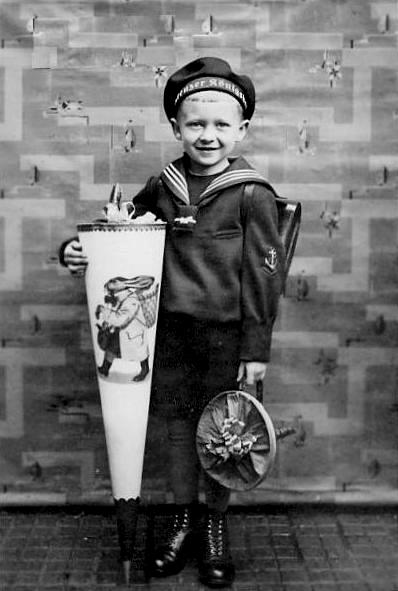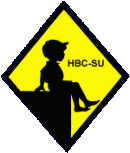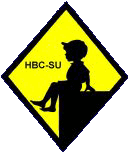
Figure 1.--This German boy in his first day portrait has both a school gift cone (Zuckertute) and a Nuremberg funnel (Nürnberger Trichter). The portrait is undated, but was probably taken in the early-1930s. |

|
Large numbers of German children had their first school day portraits taken with Zuckertute/Schultüten or school gift cones packed full of toys, candy, and school supplies. There were some other first day gifts that were not as common, such as bread or prestzels. Another gift was a funnel (Trichter). They were also filled with candy, but did not hold nearly as much goodies as a Zuckertute school cone. Thus the child often got a cone along with the funnel. A German reader with an extensive collectio of old photographs tells us, "Yes, you don't see these funnels very often. I have many first day photographss with Schultüten, but only one with a Trichter." We have yet to learn of the origins of a Zuckertute. The funnel is, however, know with some certainty. The Germans have an idiomatic expression "to funnel in knowledge" in a similar way Americans/English might say "drum" or more ominously "beat" in knowledge. The connotations are, however different. The term drum/beat in knowledge has very negative connotations. I am not sure when the expressioins would have been used in any kind of positive sence. They once were, including in Germany. See for example a advertising sign Myconius' School. The German connotation for a funnel was ore of a humerous one, the idea that a teacher could just pour in knowledge to any student, even the least capable pupil and the child could learn without any real effort. The origins for this are literary and date back to the 16th century and was especially associated with Nuremberg (Nürnberger Trichter). The expression to drum/beat in knowledge is very old with medieval German and English sources. The expression in German "oo funnel something in" is first noted in a book of proverbs by Sebastian Franck (1541). We knoew of no similar usage in English despite extensdive German emigration to America.
The phrase "Nuremberg Funnel" is widely familiar to German speakers. It first appeared in a poetry textbook published by the Pegnesischer Blumenorden (1647). The Nuremberg poet, Georg Philipp Harsdörffer (1607–58) used theterm in one of his poems. The widespread usage of the book helped to popularize the term in the German language.
A very popular tradition in Germany is to have a portrait made or to take a portrait on a child's first day of school.
It is of course a major step in a child's life and parents wanted a keep sake of the big event. The portraits are thus a charming record of German childhood and the clothing and fashions over time.
Large numbers of German children had their first school day portraits taken with Zuckertute/Schultüten or school gift cones packed full of toys, candy, and school supplies. There were some other first day gifts that were not as common, such as bread or prestzels.
Another gift was a funnel (Trichter). They were also filled with candy, but did not hold nearly as much goodies as a Zuckertute school cone. Thus the child often got a cone along with the funnel. A German reader with an extensive collectio of old photographs tells us, "Yes, you don't see these funnels very often. I have many first day photographss with Schultüten, but only one with a Trichter."
We are not yet sure of the chronology of giving these funnels as a gift on the first day of school. We have not yet noted any examples from the 19th century. Our 19th century archive is, however, limited so we are not yet sure if sucvh gifts were given yet. As far as we can tell, the chronology is similar to that of the Zuckertute/Schultüten which seems to be primarily a 20th century custom. The same seems to be the case of the funnels. We have found examples during the 1900sd-30s. The image here looks to be from the early 30s (fifure 1).
The Germans have an idiomatic expression "to funnel in knowledge" in a similar way Americans/English might say "drum" or more ominously "beat" in knowledge. The connotations are, however different. The term drum/beat in knowledge has very negative connotations. I am not sure when the expressioins would have been used in any kind of positive sence. They once were, including in Germany. See for example a advertising sign Myconius' School. The German connotation for a funnel was ore of a humerous one, the idea that a teacher could just pour in knowledge to any student, even the least capable pupil and the child could learn without any real effort.
We have yet to learn of the origins of a Zuckertute. The funnel is, however, know with some certainty.
The origins for this are literary and date back to the 16th century and was especially associated with Nuremberg (Nürnberger Trichter). The expression to drum/beat in knowledge is very old with medieval German and English sources. The expression in German "oo funnel something in" is first noted in a book of proverbs by Sebastian Franck (1541). We knoew of no similar usage in English despite extensdive German emigration to America.
The phrase "Nuremberg Funnel" is widely familiar to German speakers. It first appeared in a poetry textbook published by the Pegnesischer Blumenorden (1647). The Nuremberg poet, Georg Philipp Harsdörffer (1607–58) used theterm in one of his poems. The widespread usage of the book helped to popularize the term in the German language.
Related Chronolgy Pages in the Boys' Historical Web Site
[Main Chronology Page]
[The 1880s]
[The 1890s]
[The 1900s]
[The 1910s]
[The 1920s]
[The 1930s]
[The 1940s]
[The 1950s]
[The 1960s]
[The 1970s]
[The 1980s]
Related Style Pages in the Boys' Historical Web Site
[Return to the Main first day school portraits ]
[Main country page]
[Long pants suits]
[Short pants suits]
[Socks]
[Eton suits]
[Jacket and trousers]
[Blazer
[School sandals]
Navigate the Boys' Historical Clothing Web Page
[Introduction]
[Activities]
[Biographies]
[Chronology]
[Clothing styles]
[Countries]
[Bibliographies]
[Contributions]
[FAQs]
[Glossary]
[Images]
[Links]
[Registration]
[Boys' Clothing Home]
